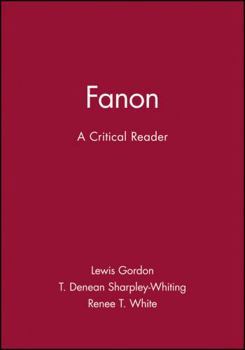Fanon: A Critical Reader (Blackwell Critical Readers)
Select Format
Select Condition 
Book Overview
Frantz Fanon is arguably the Developing World's greatest theoretician of philosophy and revolution. Psychiatrist, philosopher, social scientist and revolutionary, he posed a number of pressing concerns that span the scope of a number of political milieux and academic disciplines.
Format:Paperback
Language:English
ISBN:1557868964
ISBN13:9781557868961
Release Date:August 1996
Publisher:Wiley-Blackwell
Length:368 Pages
Weight:1.20 lbs.
Dimensions:1.1" x 5.9" x 8.9"
Customer Reviews
1 rating
An excellent (critical) reader
Published by Thriftbooks.com User , 22 years ago
This book includes twenty-one articles on Fanon as well as a `Forward', an `Introduction' and an `Afterward' which are all valuable pieces in their own right. The standard of the work is generally high and a particular feature of this volume is that many of the contributions make use of the editors' new, and often illuminating, translations from Fanon's original French.The introduction includes a brief but compelling biographical sketch and a useful five stage outline of the development of Fanon studies. This runs from the early engagement with Fanon's ideas by practical revolutionaries like Che Guevara and Paulo Freire through to biographical research; investigations into Fanon's contribution to political theory; the analysis of Fanon by postmodern and postcolonial thinkers like Said, Bhabha, Gates and Spivak and on to the recent attempts to use Fanon's thought to develop original work. The editors make it clear that this is where they locate this volume and that their purpose `is neither to glorify nor denigrate Fanon but instead to explore ways in which he is a useful thinker' (p. 7).Fanon is clear about the necessity to develop `a voracious taste for the concrete' and it's no surprise that Marxists like Cedric Robinson have attacked Homi Bhabha, Louis Gates Jr and Gayatri Spivak for bringing `an imagined Fanon in (to) their self-referential debates on colonial discourse'. Most writing here takes the world outside the seminar room into account and the majority of the articles are valuable attempts to investigate how Fanon's work can help us to make sense of the world. Fanon's ideas are bought to bear on everything from the struggle to decolonise psychiatry and psychoanalysis through to the politics of identity, the sociology of resistance and the relationship between national and feminist struggles. In recent times, Fanon has often been appropriated and domesticated by commentators who chose to ignore his clear commitment to, as Cedric Robinson puts it, `locate and subsequently advertise a fixed and stable site of radical liberationist criticism and creativity' (p. 87). Moreover, as well as ignoring Fanon's commitment to revolutionary change in the economic structure of society, many commentators have also ignored, his understanding of the role of the intellectual as well as his critique of the national bourgeoisie's attempt to reduce the nation to itself, his Leninist theory of imperialism and his insistence that the struggles of black Africa and black America are not equivalent.While not all of the papers in this book take Fanon's African radicalism as their central concern, none of them can be accused of writing as though Fanon were not a revolutionary. Only a few write as though Fanon saw no distinction between material conditions in America and Africa. The majority of the papers here, as well as the introduction and afterward which frame the collection, do give due and welcome recognition to the consciously and explicitly radical and Afri





